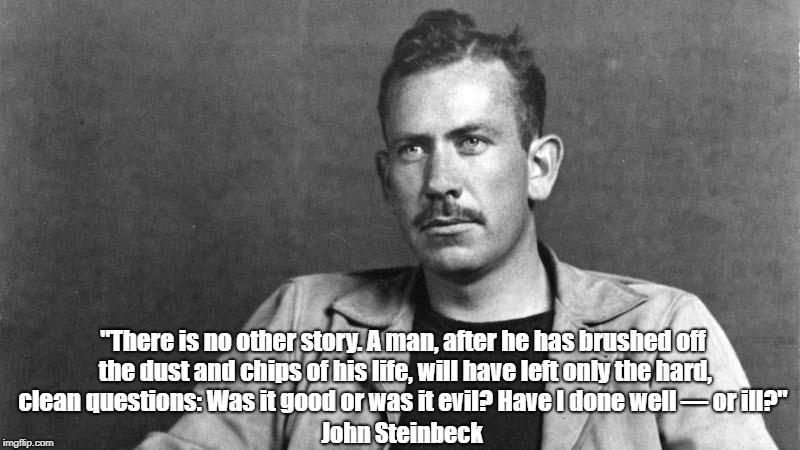
Maria Popova, Brain Pickings
Steinbeck opens the thirty-fourth chapter with a meditation on the most elemental question through which we experience and measure our lives:
A child may ask, “What is the world’s story about?” And a grown man or woman may wonder, “What way will the world go? How does it end and, while we’re at it, what’s the story about?”
I believe that there is one story in the world, and only one, that has frightened and inspired us, so that we live in a Pearl White serial of continuing thought and wonder. Humans are caught — in their lives, in their thoughts, in their hungers and ambitions, in their avarice and cruelty, and in their kindness and generosity too — in a net of good and evil. I think this is the only story we have and that it occurs on all levels of feeling and intelligence. Virtue and vice were warp and woof of our first consciousness, and they will be the fabric of our last, and this despite any changes we may impose on field and river and mountain, on economy and manners. There is no other story. A man, after he has brushed off the dust and chips of his life, will have left only the hard, clean questions: Was it good or was it evil? Have I done well — or ill?
At the most fundamental level, the triumph of good over evil presupposes an openhearted curiosity about what is other than ourselves and a certain willingness for understanding — the moral choice of fathoming and honoring the reality, experience, and needs of persons and entities existing beyond our own consciousness. Steinbeck, too, saw the centrality of empathic understanding in the choice of goodness. Perhaps unsurprisingly — since he used his private journal as a creative sandbox for his novels — this sentiment originated in a diary entry.
Decades before Annie Dillard contemplated why a generosity of spirit is the animating force of good writing, Steinbeck echoes Hemingway — “As a writer you should not judge. You should understand.” — and reflects in a journal entry from 1938, quoted in Steinbeck Center director Susan Shillinglaw’s introduction to a 1993 Penguin Classics edition of Steinbeck’s Of Mice and Men:
In every bit of honest writing in the world… there is a base theme. Try to understand men, if you understand each other you will be kind to each other. Knowing a man well never leads to hate and nearly always leads to love. There are shorter means, many of them. There is writing promoting social change, writing punishing injustice, writing in celebration of heroism, but always that base theme. Try to understand each other.
Complement with Hannah Arendt on our mightiest antidote to evil, James Baldwin on the terror within and the evil without, Mary McCarthy on human nature and how we determine if evil is forgivable, and Fyodor Dostoyevsky on why there are no bad people, then revisit Steinbeck on being vs. becoming, the difficult art of the fried breakup, and his remarkable advice on falling in love in a letter to his teenage son.
No comments:
Post a Comment